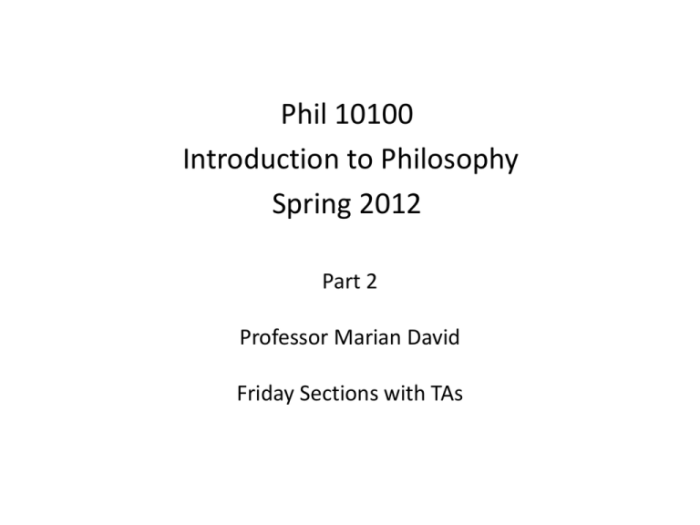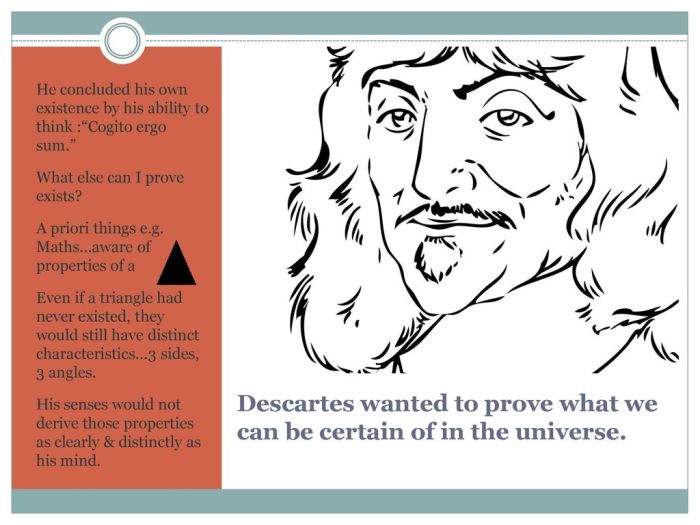Descartes notes that we have the ability to imagine, and this profound observation opens up a realm of inquiry into the nature of perception, creativity, memory, consciousness, and subjectivity. Imagination, as we shall explore, is a multifaceted cognitive faculty that plays a pivotal role in shaping our understanding of the world and ourselves.
Imagination allows us to transcend the boundaries of our immediate experience, enabling us to envision alternative realities, conjure up novel ideas, and recall past events with vivid detail. It is through imagination that we can create, innovate, and problem-solve, expanding the horizons of human knowledge and potential.
Imagination and Perception

Imagination and perception are closely intertwined processes that shape our experience of the world. Imagination refers to the ability to create mental representations of objects, events, and experiences that are not present in the immediate environment. Perception, on the other hand, involves the interpretation of sensory information from the external world.
These two processes interact and influence each other in various ways.
One way in which imagination influences perception is by providing expectations and biases. Our expectations about what we are likely to see or hear can shape how we interpret sensory information. For example, if we expect to see a red car, we may be more likely to notice a red car in our surroundings, even if it is not the most salient object in our field of view.
s, Descartes notes that we have the ability to imagine
- Imagination and Perception: The Interplay of Mental and Sensory Processes
- The Role of Imagination in Shaping Expectations and Biases
- Imagination’s Influence on the Interpretation of Sensory Information
Imagination and Creativity

Imagination plays a crucial role in creative processes. Creativity involves the generation of novel ideas, solutions, or artistic expressions. Imagination provides the raw material for creativity by allowing us to generate and explore new possibilities.
There are different types of imagination that contribute to creativity. One type is divergent thinking, which involves generating multiple ideas or solutions to a problem. Another type is lateral thinking, which involves approaching a problem from an unconventional or unexpected angle.
s, Descartes notes that we have the ability to imagine
- The Role of Imagination in Creative Thinking
- Different Types of Imagination and Their Contributions to Creativity
- Imagination as a Catalyst for Innovation and Problem-Solving
Imagination and Memory
Imagination and memory are closely connected processes. Imagination can enhance memory recall and consolidation by providing vivid mental representations of experiences. When we imagine an event or experience, we create neural pathways that strengthen the memory of that event.
Imagination also plays a role in shaping autobiographical memories. Our memories of our past experiences are not simply objective records of events but are often reconstructed and shaped by our imagination. We may imagine ourselves in different roles or scenarios, or we may embellish or omit certain details in order to create a more coherent or meaningful narrative.
s, Descartes notes that we have the ability to imagine
- Imagination’s Role in Enhancing Memory Recall and Consolidation
- Imagination and the Reconstruction of Autobiographical Memories
- The Subjective Nature of Memory and the Influence of Imagination
Imagination and Consciousness: Descartes Notes That We Have The Ability To Imagine
Imagination is closely tied to consciousness. Imagination allows us to create mental images and experiences that are not present in the external world. These mental representations can be vivid and immersive, and they can alter our state of consciousness.
Imagination can be used to induce altered states of consciousness, such as meditation, hypnosis, or lucid dreaming. In these states, the imagination becomes more active and less constrained by the limitations of the physical world. This can lead to profound experiences and insights.
s, Descartes notes that we have the ability to imagine
- Imagination and the Creation of Mental Images and Experiences
- Imagination’s Role in Altered States of Consciousness
- The Potential of Imagination to Transform Our Consciousness
Imagination and Subjectivity
Imagination is a subjective process that varies across individuals and cultures. Our imagination is shaped by our unique experiences, beliefs, and values. As a result, the mental representations that we create are often unique to us.
The subjectivity of imagination has implications for our understanding of the world. Our imagination can lead us to see the world in different ways, and it can shape our beliefs and values. It is important to be aware of the subjective nature of imagination and to be open to considering different perspectives.
s, Descartes notes that we have the ability to imagine
- The Subjective Nature of Imagination and Its Implications
- Individual and Cultural Variations in Imagination
- Imagination and the Shaping of Personal Identity and Perspectives
Imagination and Education

Imagination is an essential aspect of education. It allows students to explore new ideas, solve problems, and develop their creativity. Imagination can be fostered in educational settings through a variety of methods, such as storytelling, role-playing, and creative writing.
Imagination is also important for developing critical thinking and problem-solving skills. By imagining different scenarios and possibilities, students can learn to think more flexibly and creatively. This can help them to find innovative solutions to problems and to make better decisions.
s, Descartes notes that we have the ability to imagine
- The Importance of Imagination in Education
- Methods for Fostering Imagination in Educational Settings
- Imagination and the Development of Critical Thinking and Problem-Solving Skills
Helpful Answers
What is the relationship between imagination and perception?
Imagination can influence perception by priming our brains to expect certain stimuli or by altering our interpretation of sensory input.
How does imagination contribute to creativity?
Imagination allows us to generate new ideas, explore different perspectives, and envision novel solutions.
What is the role of imagination in memory?
Imagination can enhance memory recall by providing vivid mental images and by linking new information to existing memories.